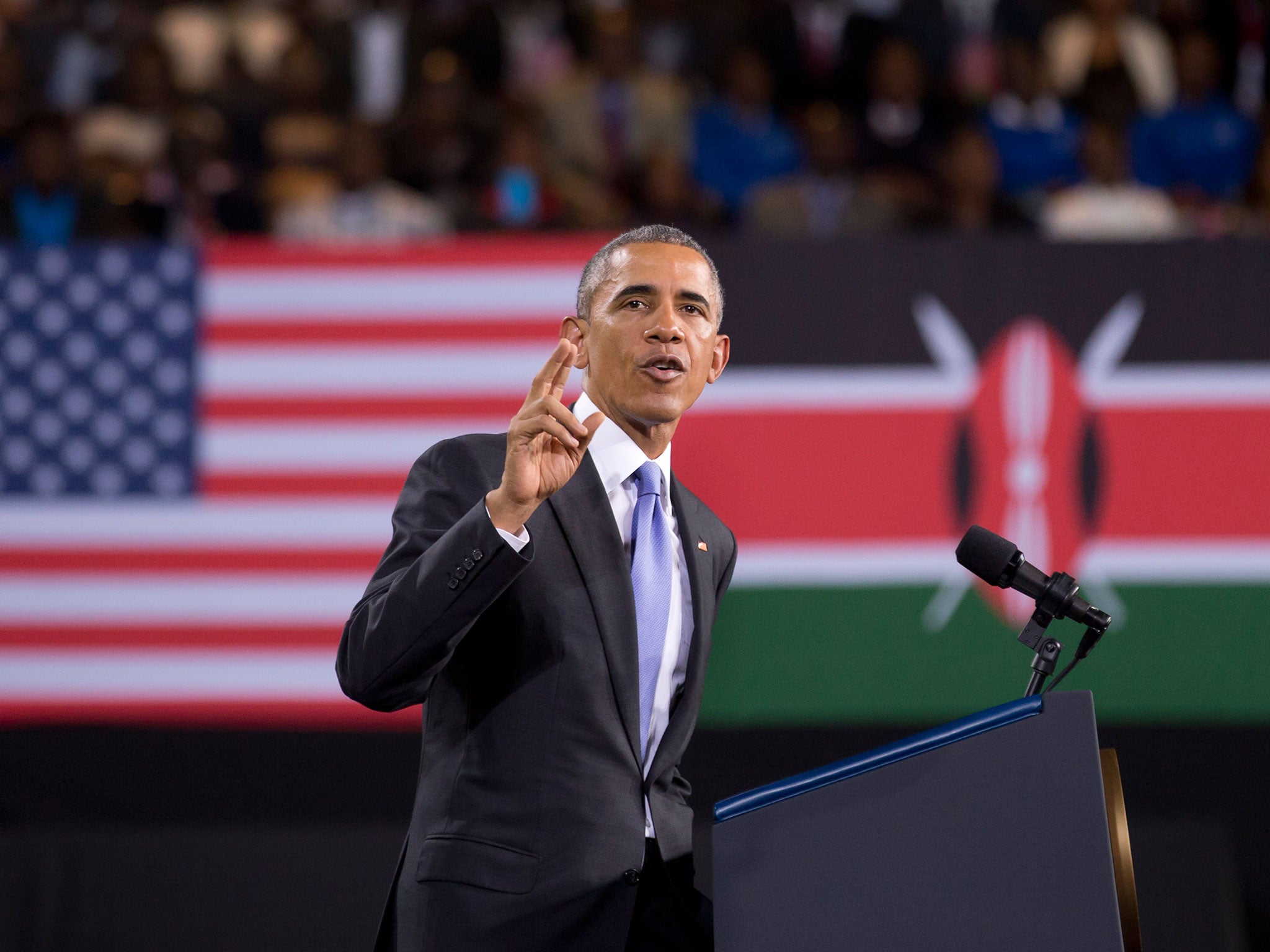Barack Obama in Kenya: US President uses farewell speech to tell young people to build a future in Africa
In a stirring speech Obama reminded the Kenyan people of the many challenges facing the country

President Barack Obama has called on Kenyans, and especially the country’s youth, to seize the moment to take their country forward, in a stirring speech that brought to an end his first trip as President to his father’s homeland.
“Kenya is at a crossroads, at a moment filled with peril but also enormous promise,” said the US leader to a crowd of 4,500 students, officials, civil society leaders and other guests packed into the indoor arena of Nairobi’s Kasarani stadium. “When it comes to the people of Kenya, particularly the youth, I believe there is no limit to what you can achieve,” Mr Obama added in an address that was broadcast live across the country, noting that young Africans were no longer constrained by colonialism, nor should they feel the need to go overseas to realise their dreams.
“I’m confident that your future is going to be written across this country and this continent by young people like you,” said the first black US President, who has created a youth leadership programme for Africa, where around 60 per cent of the population is below the age of 35. To resounding cheers, he added: “Because of Kenya’s progress and your potential, you can build your future right here, right now.”
Mr Obama saluted that progress, noting Kenya’s thriving economy, democratic advances, its leadership in conservation and its marathon runners’ brilliance. He also highlighted the achievements of young Kenyans such as the child rights activist Josephine Kulea, who runs a foundation that rescues girls from child marriage and FGM, and Jamila Abbas, who developed a mobile app supplying price information to farmers.
But he strongly reminded the Kenyan people of the many challenges that the country faces, ranging from a “serious threat” from Somalia-based militants al-Shabaab, an unequal distribution of wealth and opportunity, and corruption that he called “an anchor that weighs you down”.
He also warned against ethnic divisions and the discrimination against minority groups, mentioning that both Kenya and the United States had minority Muslim communities, and he urged Kenyans to overcome such obstacles.
The choice of venue itself reflected one of these concerns. Last year, hundreds of ethnic Somalis were allegedly detained in the stadium complex as part of a security operation that followed a series of attacks in Nairobi and Mombasa.
Al-Qaeda-linked terrorists based in neighbouring Somalia have carried out a string of attacks in Kenya that have left hundreds dead, including at least 67 in an attack on the Westgate shopping mall in Nairobi in September 2013 and nearly 150 in an attack on a university earlier this year.
The scenes that emerged from the stadium last year contrasted sharply with Sunday’s party-like atmosphere in the arena, where American and Kenyan flags draped the walls and Kenyan musicians warmed up the crowd before Mr Obama’s arrival. University and high school students clustered around the stage, posing for selfies.
In a speech at once both forceful and informal, Mr Obama told of his grandfather’s time as a cook for the British in the colonial era and of his own experiences visiting Kenya for the first time nearly 30 years ago. He recalled eating the local specialities sukuma wiki and ugali [greens and maize meal], much to the delight of the crowd.
His half-sister Auma Obama, who introduced the President, observed that she had picked him up at the airport on his first visit in a battered Volkswagen Beetle, only to have him give her a ride into town on Friday evening in the presidential vehicle known as “the Beast”.
During a large segment of his speech devoted to calling for equal rights for women and girls, much of the audience cheered in agreement. “Kenya will not succeed if it treats its women and girls as second-class citizens,” said Mr Obama, decrying practices such as forced marriage and female genital mutilation as “bad traditions”. He also stressed that the education of girls should be prioritised.
Paul Odero, a 25-year-old business administration student at the Presbyterian University in Nairobi, said as he left the venue that he was feeling “very inspired”.
“It’s good for people like us to hear this because we are doing our degrees so that we can make changes in the country,” he said. “Empowering girls and women is so important.”
Throughout his speech, Mr Obama offered his support and that of the US as a partner, but stressed that hard work and effort were required to build “a Kenya where the inherent dignity of every person is respected and protected, and there is no limit to what a child can achieve”. As he left the stadium George Muringi, 17, a scholarship student, said: “It’s really a challenge to us to take up what he is saying.”
Last night, Mr Obama became the first US President to visit Ethiopia, flying to Addis Ababa to meet the country’s leaders and address a meeting of the African Union. He faces criticism from human rights groups that accuse the government there of cracking down on dissent by arresting journalists, opposition party supporters and others.
Join our commenting forum
Join thought-provoking conversations, follow other Independent readers and see their replies
Comments